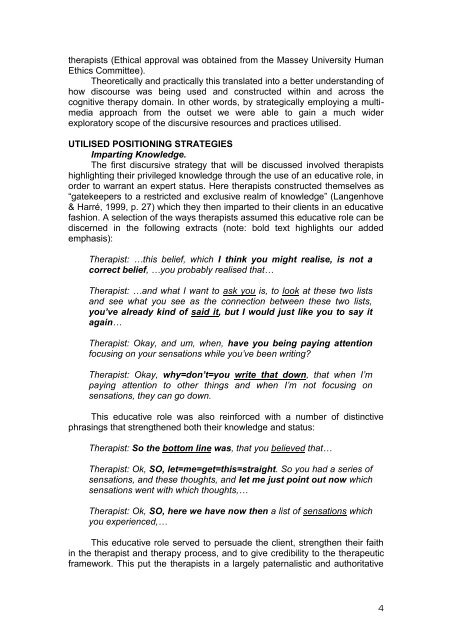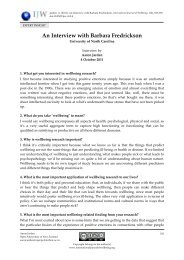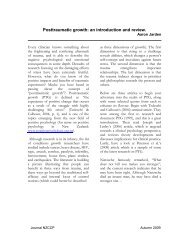The expert therapist - Aaron Jarden
The expert therapist - Aaron Jarden
The expert therapist - Aaron Jarden
Create successful ePaper yourself
Turn your PDF publications into a flip-book with our unique Google optimized e-Paper software.
<strong>therapist</strong>s (Ethical approval was obtained from the Massey University Human<br />
Ethics Committee).<br />
<strong>The</strong>oretically and practically this translated into a better understanding of<br />
how discourse was being used and constructed within and across the<br />
cognitive therapy domain. In other words, by strategically employing a multimedia<br />
approach from the outset we were able to gain a much wider<br />
exploratory scope of the discursive resources and practices utilised.<br />
UTILISED POSITIONING STRATEGIES<br />
Imparting Knowledge.<br />
<strong>The</strong> first discursive strategy that will be discussed involved <strong>therapist</strong>s<br />
highlighting their privileged knowledge through the use of an educative role, in<br />
order to warrant an <strong>expert</strong> status. Here <strong>therapist</strong>s constructed themselves as<br />
“gatekeepers to a restricted and exclusive realm of knowledge” (Langenhove<br />
& Harré, 1999, p. 27) which they then imparted to their clients in an educative<br />
fashion. A selection of the ways <strong>therapist</strong>s assumed this educative role can be<br />
discerned in the following extracts (note: bold text highlights our added<br />
emphasis):<br />
<strong>The</strong>rapist: …this belief, which I think you might realise, is not a<br />
correct belief, …you probably realised that…<br />
<strong>The</strong>rapist: …and what I want to ask you is, to look at these two lists<br />
and see what you see as the connection between these two lists,<br />
you’ve already kind of said it, but I would just like you to say it<br />
again…<br />
<strong>The</strong>rapist: Okay, and um, when, have you being paying attention<br />
focusing on your sensations while you’ve been writing?<br />
<strong>The</strong>rapist: Okay, why=don’t=you write that down, that when I’m<br />
paying attention to other things and when I’m not focusing on<br />
sensations, they can go down.<br />
This educative role was also reinforced with a number of distinctive<br />
phrasings that strengthened both their knowledge and status:<br />
<strong>The</strong>rapist: So the bottom line was, that you believed that…<br />
<strong>The</strong>rapist: Ok, SO, let=me=get=this=straight. So you had a series of<br />
sensations, and these thoughts, and let me just point out now which<br />
sensations went with which thoughts,…<br />
<strong>The</strong>rapist: Ok, SO, here we have now then a list of sensations which<br />
you experienced,…<br />
This educative role served to persuade the client, strengthen their faith<br />
in the <strong>therapist</strong> and therapy process, and to give credibility to the therapeutic<br />
framework. This put the <strong>therapist</strong>s in a largely paternalistic and authoritative<br />
4





